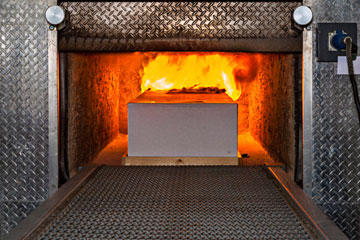
A body in the fire-based crematory oven of Lakewood Cemetery.
(5 of 8)
A Greener Ending?
The U.S.'S history as a predominantly Christian nation has arguably been the one true barrier holding cremation back. That helps explain why there are still fewer cremations in the South than any other region in the U.S. (In more-secular Europe, cremation rates in many countries are much higher.) Revelation in the New Testament foretells a time when a trumpet will sound and the dead in Christ shall rise first as Jesus returns. It doesn't say anything about the dead rising from their reefs.
For almost its entire history, the Roman Catholic Church has been against the practice. It wasn't until the 1960s that the church officially allowed it and only 1997 when the Holy See gave specific permission for U.S. bishops to allow cremated remains to be part of a funeral mass. For Protestants, burial is more historical practice than theological doctrine. Today many more preachers are agnostic about cremation. Even Billy Graham has said there's nothing in the Bible that forbids it. That's helped make the practice more acceptable in the Bible Belt, the one region where cremation has yet to fully take hold.
In both Judaism and Islam, cremation is widely considered strictly forbidden. But while very few Muslims have been cremated, some Jewish funeral directors say they are getting more requests for cremation from progressive Jews.
For those who aren't devout, there is still the idea that we're at rest once a body is buried. That notion is peaceful. It's comforting. And it's nowhere near the truth. "When we die," says Engler, "our body immediately begins to go back to what it is. Natural, organic elements. And putting aside the religious notions, when we die, our body tries to go back and disappear. That horrible process of decomposition begins, and it completely takes over the body. Cremation just speeds up that process."
In fact, there's more than one way to do it. When families wanting cremation walk into Bradshaw Funeral & Cremation Services in Stillwater, Minn., they're presented with two options: fire or water.
Bradshaw is one of a handful of funeral homes in the U.S. offering a new method of cremation called alkaline hydrolysis--what they market as green or water-based cremation. For years, the technology was available only at the nearby Mayo Clinic, where the experimental medical center used it as an environmentally friendly way to dispose of bodies used for research. In 2003, Minnesota became the first state to approve it for the general public. At Bradshaw, which has only offered water-based cremation since last July, it's been wildly popular. Four out of five families presented with flame- and water-based cremations--both priced the same--choose water.
"We anticipated that the bigger reason was going to be the environmental side of it," says co-owner Jason Bradshaw, referring to the lack of emissions from water-based cremation. "The larger reason has actually been people who don't like the fire component. They see this as being a gentler alternative."
